A Bangladeshi worker is dying from cancer. Singaporeans made sure he got his last wish to go home
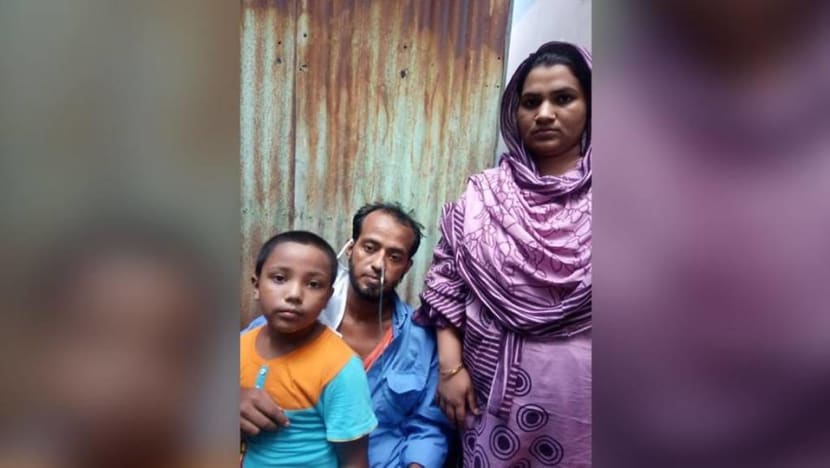
Mr Rana Sikder and his family on the first day he was back in Bangladesh. (Photo: Cynthia Goh)
SINGAPORE: Bangladeshi worker Rana Sikder, 34, was already losing his battle with stomach cancer when he thought he had lost it all.
The shipyard worker in Singapore was looking forward to going home and spending his final days with his wife and six-year-old son, but a COVID-19 lockdown in Bangladesh meant his flight on May 19 was cancelled.
Dr Cynthia Goh of the National Cancer Centre Singapore (NCCS) had been keeping tabs on his case since May 15, when she heard the bad news three days later. She also learnt that the next flight out would only be on Jun 10.
“Everybody was a bit distressed,” the senior consultant at NCCS’ supportive and palliative care division told CNA on Monday (Jun 1). “His condition was very bad, and we thought: ‘Is he going to survive till the end of (May)?’”
Dr Goh, who also chairs an Asia-Pacific palliative care network, first heard of Mr Sikder when his medical team at the Singapore General Hospital (SGH) asked her about hospital referrals in Bangladesh.
“So one of the nurses said to me: ‘Why don’t we try and do crowdfunding and get him back on medical evacuation?’” she said, recalling the discussion on May 18.
“I had no idea how to do this or know anybody who does it. Where do we even start? So I chewed on it a bit, and the next afternoon I rang one of my friends who’s very well-connected.”
READ: 'I am okay now': Bangladeshi whose wife gave birth while he was critically ill with COVID-19 to be moved to community hospital
What Dr Goh didn’t realise was that she would soon be at the centre of a whirlwind few days.
She called people in high places, haggled with a medical evacuation company and sorted out last-minute landing permits. And in three days, donors managed to raise S$60,000 for the cause.
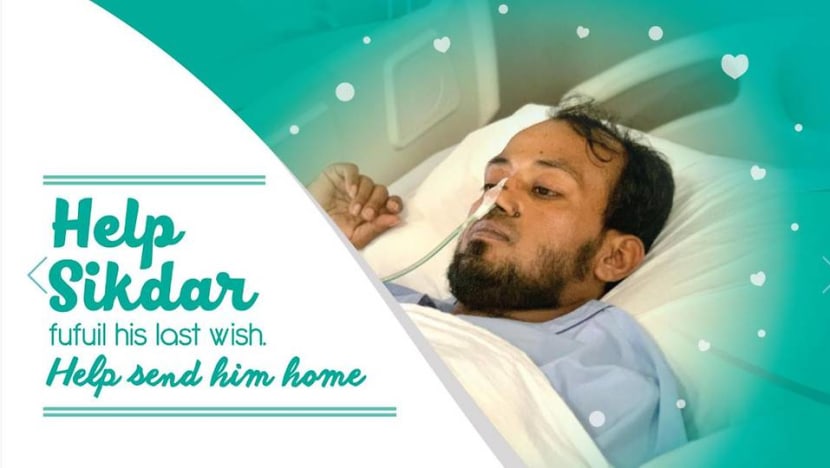
The hard work paid off when Mr Sikder was flown home on a private jet on the evening of May 22, just in time for the eve of Hari Raya Puasa.
“So on the last day of the fast, he could break fast with his family,” Dr Goh said. “And then everybody celebrated the next day. It’s almost like a fairytale that he managed to arrive home for Eid. That to me is very, very special.”
FINDING OUT THE WORST
But to understand why Dr Goh was so determined to grant the dying man his last wish, you have to go back to April to learn about his plight.
Back then, Mr Sikder lay in a hospital bed at SGH as doctors confirmed his worst fears. He had earlier been wheeled into an operating theatre, hopeful that they could stem his cancer.
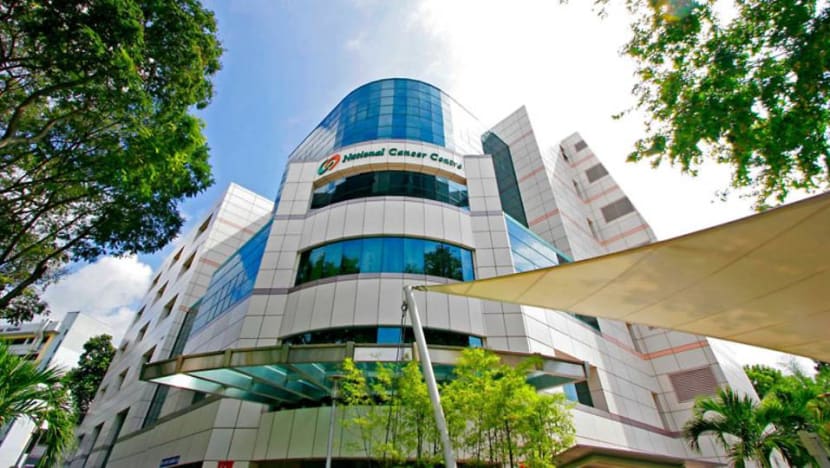
Mr Sikder did not inform the family of his initial cancer diagnosis, his wife told CNA on Monday, as he was confident that a country known for its high standards of medical care would do everything it could to help him recover.
“But when doctors asked Rana for consent to do the major operation, he told us about his condition,” Ms Mousumi Akhter, 25, said through an interpreter. “That was when we realised his prognosis was severe. We were concerned at that time.”
READ: 'Just pray, very soon I can get well': Migrant workers from dorms battle on
During the surgery, doctors found that the cancer had taken over his stomach. He wasn’t fit enough, so chemotherapy wasn’t an option either. Dr Goh said there wasn’t much left that they could do.
“I think it was at that stage that he said: ‘Well, what have I got left?’” Dr Goh said. “Originally, he just wanted to die, and he asked about euthanasia, whether he could be killed.”
Dr Goh said the team at SGH supported him through this ordeal, and helped him find solace when all hope was gone.
“He managed to find hope in seeing his son,” she added. “If he could see his son, then he will continue to live until then. That was what motivated us to get him back.”
After all, the last time Mr Sikder saw his family was in September last year, before he left for the greener pastures of Singapore, like many of his compatriots. He had also worked in Singapore for many years prior to this, since he first arrived as a 17-year-old.
Mr Sikder’s brother Masum, 36, said the family worried that they would not see him before he died. This is especially as their home is in Narayanganj, a city south of the capital Dhaka and one of the country’s COVID-19 hotspots.
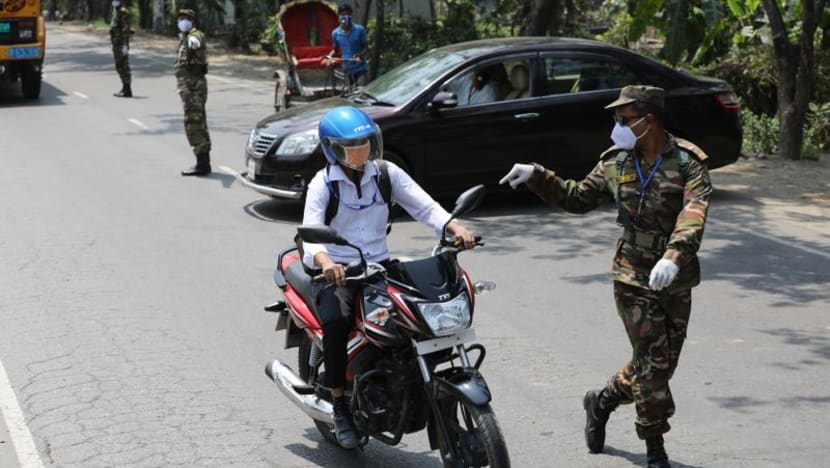
ROLLING UP HER SLEEVES
The pandemic was just one of the hurdles Dr Goh had to overcome to get Mr Sikder home.
On May 19, she reached out to her well-connected friend, National Council of Social Service president Anita Fam, who decided that they should link up with the Migrant Workers' Centre (MWC).
The MWC, an established organisation promoting migrant workers' rights in Singapore, got in touch with the Bangladesh High Commission on Mr Sikder's case. But Dr Goh said the commission didn't have the resources to bring him back.
So the MWC decided to take on the case, and given the "urgent and quite desperate" situation, would crowdfund for the medical evacuation. Still, the clock was ticking, and Dr Goh knew they could not wait for the funds to be raised.
READ: COVID-19: Battling fear and boredom, migrant workers grapple with isolation in dormitories
By the next day, the team got the cheapest quote for a medical flight to Bangladesh: S$55,000 via Hope Medflight Asia. The MWC then approached the aircraft charterer's union, which pledged to shave a few thousand dollars off the price.
"So I went back to the (company) and said: 'Look, we've got a discount. Make sure you work that into the quote,'" Dr Goh said, stating that the final price came up to about S$48,000.
Next up was actually coming up with that sort of money. MWC chairman Yeo Guat Kwang and Ms Fam agreed to underwrite the cost of the evacuation pending the fundraiser, allowing the flight to proceed.
"Without their guaranteeing the payment, we couldn't even start asking the medical evacuation team to get into action," Dr Goh said. "So many people helped, and we didn't believe that it could be done. And at many steps, it almost couldn't be done."
PERSEVERANCE PAYS OFF
Over the next day or so, a number of administrative challenges threatened to scupper their efforts.
The medical evacuation company scheduled the flight for May 24, and so the Bangladesh High Commission called Dr Goh to ask for Mr Sikder's particulars and tell her about landing permits. To get the permits, information on who would be receiving Mr Sikder had to be provided.
Dr Goh tapped on her vast pool of contacts in Bangladesh – she had worked there for a few years – and asked who they could "call on to let this plane land".
"Everybody knew somebody," she said, "They knew somebody in the airport, air force or civil aviation. And they all wanted to help."
Her contacts advised her to get a letter of acceptance from Dhaka's Bangabandhu Sheikh Mujib Medical University Hospital, which has a palliative care centre. And that Friday, when Bangladeshis usually don't work, the hospital somehow got back with the letter.
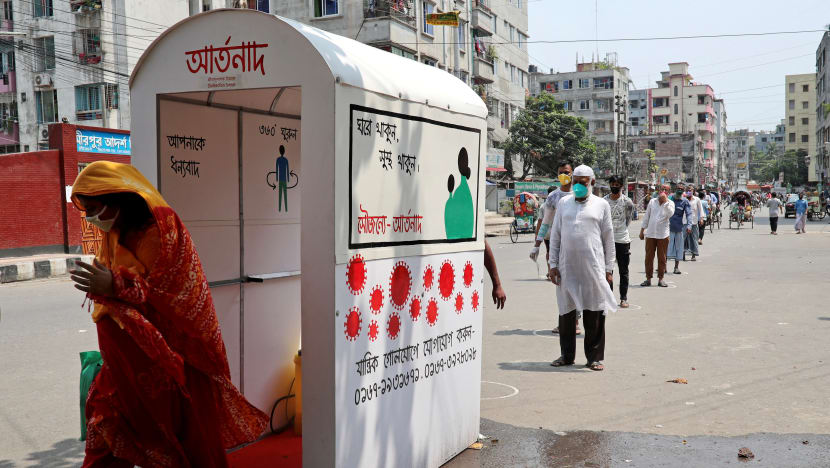
Dr Goh submitted it to the Bangladesh High Commission, but it wasn't over yet. It said she would also have to send proof that everybody landing in Bangladesh, including the pilots and accompanying doctor, have tested negative for COVID-19.
The medical evacuation company told Dr Goh that this wouldn't be necessary, as no one but Mr Sikder – who had already tested negative – would be leaving the aircraft. So she got in touch with the high commission again.
"I said to him: 'Look, these people are not entering your country. Can you please ask whether they can just land and then fly off again?'" she said. "I think he had to go through several layers, but eventually he came back and said that's fine."
A TWIST OF FATE
It was already the afternoon of May 22 and Dr Goh thought she could finally breathe easy. But fate had other plans.
The medical evacuation company said it had to push the flight forward to that evening, so Dr Goh approached the high commission again to ask if the landing clearance could be expedited.
"Everybody we called was so touched by the story that they all wanted to help," she said again. "There were all these high-up people who said: 'We will get this plane down.'"
Meanwhile, Mr Sikder's medical team was also preparing for his departure. They ensured he had his passport and belongings, and packed some action figurines and toys they had bought for his son.
"He was saying that his son was quite upset," Dr Goh said, remembering the tears in Mr Sikder's eyes. "His son said to him: 'I sent you there to buy me toys, and you became sick when you were there.' That really touched my team."
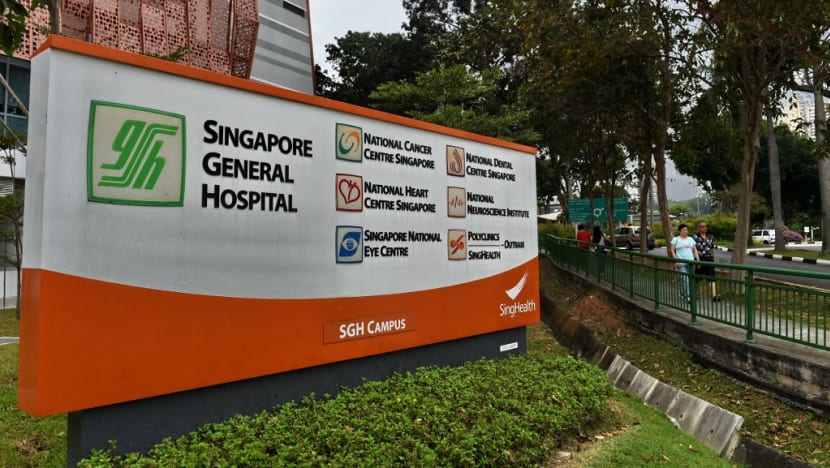
The landing clearance finally came through at 8.30pm, after the high commission pushed it through some final hoops. Mr Sikder was loaded into an ambulance headed for Seletar Airport, where he took off shortly after 9pm.
At around the same time, the fundraiser for Mr Sikder launched on Giving.sg, and the medical team furiously sent text messages to everybody they knew to support it.
It turns out they didn't need to: Within the next few days, the fundraiser hit its target of S$60,000. Most of it would pay for the flight, and the rest would go to his family.
"We were absolutely amazed," Dr Goh said. "I knew that people would be very generous, but I didn't know it would all happen so quickly."
Mr Yeo said the MWC was "touched by Rana's last wish" and was happy to help fulfil it in time. "We would also like to thank members of the public who have responded expeditiously to our call for donations," he added.
JOYFUL REUNION
After landing in Dhaka, Mr Sikder was still well enough when he was taken to the Bangladeshi hospital, where a small entourage of family and reporters waited. He gave an interview before being discharged the next day on May 23.
According to Dr Goh, Mr Sikder spent the day breaking fast with his family and then celebrating Hari Raya together. The earlier flight had coincidentally made the "heartwarming" reunion that much more special, she added.
Ms Akhter said she is grateful for the effort Dr Goh and her team put in.
"We are happy that we can celebrate Eid together in Bangladesh at home," she said. "This is amazing for my family, because we didn't think we could do this when there is a lockdown in Bangladesh and around the world."
However, Dr Shahinur Kabir, a hospice doctor who cares for Mr Sikder through telemedicine, said he can't really eat or move, and that his condition is now deteriorating.
Mr Sikder can only say a few words, so the family tries to understand him through his facial expressions. They also feed him a few drops of fruit juice and try to help him sit up sometimes.
Ms Akhter said her husband, who used to weigh more than 80kg, is thin now. During the interview, Mr Sikder lay in bed with a colostomy bag attached to his hip, his eyes partially closed.
She said their son finds it hard to recognise him. "He comes here sometimes, but now he usually stays at my mother's place," she said, her voice tinged with emotion.
"I STILL PRAY"
There is, however, a ray of light.
Dr Kabir said Mr Sikder is not in pain, noting that he's only on antibiotics, anti-vomiting injections and intravenous fluids for hydration. "It's good for him that I don't give him any pain medications," he added.
While Ms Akhter knows that Mr Sikder is seriously ill, she said she is hoping for a miracle. "I still pray that he will get better and talk to me," she stated.
Dr Goh said Mr Sikder wouldn't have believed that her team could pull off his repatriation, even as he consented to his picture being taken for the fundraiser. A Bangladeshi newspaper quoted him as saying that Dr Goh and her team were "angels".
"We were very relieved that he managed to go back, and also extremely happy that he was able to have that very precious time together," Dr Goh said.
"You think about the loss the family would have felt ... and for him to die alone in a foreign country, it's horrible."














